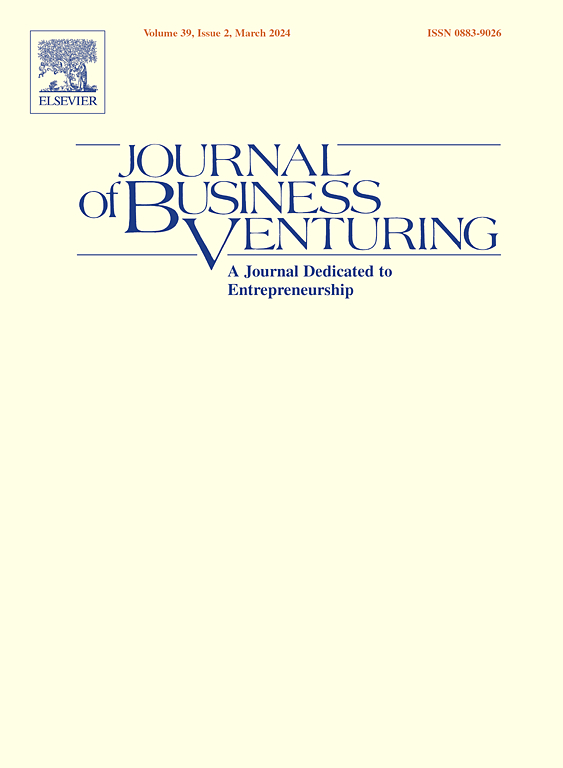Are entrepreneurs more upwardly mobile?
IF 8.9
1区 管理学
Q1 BUSINESS
引用次数: 0
Abstract
Entrepreneurship is often hailed as a path to upward intergenerational mobility, but few studies have explicitly tested this belief. Drawing on insights from the literature on entrepreneurial heterogeneity and returns, we compare the extent and direction of mobility across generations among Swedish entrepreneurs and employees. We study intergenerational income rank mobility using high-quality lifetime income measures for 215,000 father-son pairs. Entrepreneurs are drawn disproportionately from both poorer and richer families, but the patterns we uncover hold across the entire paternal income distribution. Sons who own incorporated businesses are more upwardly mobile across generations than employees; sons who own unincorporated businesses are more downwardly mobile. Selection on (un)observable traits fully explains incorporated sons’ moves up, but only a small share of unincorporated sons’ moves down. Income underreporting and, crucially, lower returns to human capital explain the remaining downward mobility. Unincorporated ventures appear to use entrepreneurs’ human capital inefficiently.
企业家的地位是否更高?
创业常常被誉为代际向上流动的途径,但很少有研究明确地验证了这一观点。借鉴文献中关于企业家异质性和回报的见解,我们比较了瑞典企业家和员工之间代际流动的程度和方向。我们使用高质量的终身收入测量方法研究了215,000对父子的代际收入等级流动性。企业家来自贫穷和富裕家庭的比例不成比例,但我们发现的模式适用于整个父亲的收入分配。拥有公司的儿子比雇员更容易在几代人之间向上流动;拥有非法人企业的儿子更容易向下流动。对(非)可观察性状的选择完全解释了结社儿子的晋升,但只有一小部分结社儿子的晋升。收入少报以及(至关重要的)人力资本回报率较低解释了仍然存在的向下流动性。非法人企业似乎没有有效地利用企业家的人力资本。
本文章由计算机程序翻译,如有差异,请以英文原文为准。
求助全文
约1分钟内获得全文
求助全文
来源期刊

Journal of Business Venturing
BUSINESS-
CiteScore
16.70
自引率
6.90%
发文量
59
审稿时长
77 days
期刊介绍:
The Journal of Business Venturing: Entrepreneurship, Entrepreneurial Finance, Innovation and Regional Development serves as a scholarly platform for the exchange of valuable insights, theories, narratives, and interpretations related to entrepreneurship and its implications.
With a focus on enriching the understanding of entrepreneurship in its various manifestations, the journal seeks to publish papers that (1) draw from the experiences of entrepreneurs, innovators, and their ecosystem; and (2) tackle issues relevant to scholars, educators, facilitators, and practitioners involved in entrepreneurship.
Embracing diversity in approach, methodology, and disciplinary perspective, the journal encourages contributions that contribute to the advancement of knowledge in entrepreneurship and its associated domains.
 求助内容:
求助内容: 应助结果提醒方式:
应助结果提醒方式:


